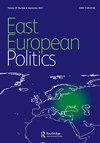Development and (re)organisation of the Czech LGBT+ movement (1989–2021)
IF 3.1
2区 社会学
Q1 AREA STUDIES
引用次数: 1
Abstract
ABSTRACT This article is to review the development of the LGBT+ movement in Czechia after 1989. The analytical section introduces three distinctive phases: (1) the movement’s establishment and development during the 1990s, (2) the period culminating (and declining) with the adoption of the Registered Partnership in 2006, and (3) the period characterised as a restructuring of the movement towards the goal of equal parental and marriage rights. The article analyses the development and changes in the organisational structure of the movement (according to [Císař, Ondřej. 2013. “A Typology of Extra-Parliamentary Political Activism in Post-Communist Settings: The Case of the Czech Republic.” In Jacobsson and Saxonberg, 139–168]). It uncovers heterogeneity, mostly concentrated around short transitory moments in each phase which allow the establishment of short-term, often informal, self-organised organisations oriented less on transactional activism, typical for NGOs of the region and time period.捷克LGBT+运动的发展和(重新)组织(1989-2021)
本文旨在回顾1989年后捷克LGBT+运动的发展历程。分析部分介绍了三个不同的阶段:(1)该运动在20世纪90年代的建立和发展,(2)随着2006年采用注册合伙制而达到高潮(和衰落)的时期,以及(3)这一时期以运动的重组为特征,朝着平等的父母和婚姻权利的目标迈进。本文分析了运动组织结构的发展变化(根据[Císař, Ondřej])。2013. 后共产主义背景下议会外政治活动的类型学:以捷克共和国为例。在雅各布森和萨克森伯格,139-168])。它揭示了异质性,主要集中在每个阶段的短暂瞬间,这些瞬间允许建立短期的、通常是非正式的、自我组织的组织,这些组织较少以交易主义为导向,这是该地区和那个时期的非政府组织的典型特征。
本文章由计算机程序翻译,如有差异,请以英文原文为准。
求助全文
约1分钟内获得全文
求助全文

 求助内容:
求助内容: 应助结果提醒方式:
应助结果提醒方式:


